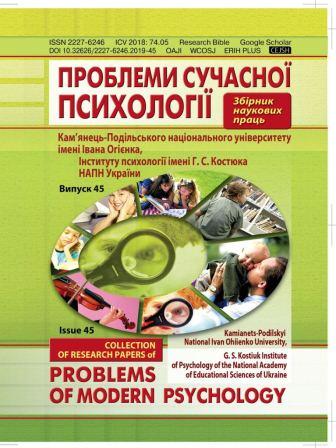Psychological Justification of Using Authentic Fund of English Language by the Teachers at Secondary Schools
DOI:
https://doi.org/10.32626/2227-6246.2019-45.104-127Keywords:
psycholinguistic analysis, authenticity of the material, proverbs, sayings, intuition, «subjectivization» of studied material, authentic inter-subjectivity, authentic intentionality.Abstract
The psycholinguistic analysis of English proverbs and sayings with the com-
ponent of «human activities» is made in the article. It is determined that exis-
tential phenomenology corresponds to a functionalcommunicative, cognitive
and anthropogenic paradigm of the research of these lexical units of the Eng-
lish language. The latetr one generates a series of psycholinguistically prede-
termined processes.
The 0xFB01rst process is actualization of the reader’s intuition as a kind of
«presence» of the essence of the object having been studied in a mind of a
subject, «without ideological», «selfserving» presentation, due to intentional
contemplation and understanding of its eidos. It was indicated that that mo-
ment, in turn, was largely due to the authenticity of the materials having been
studied. The second process is a peculiar «subjectivization» of lexical material
having been studied, when the reader seems to «reduce» himself / herself
implicitly, his / her essence, his / her personal meaning in the language. The
latetr one allows the reader to «stay» in a paradigm of a language, «passing
through brackets» only priori judgments about a particular object of the re-
search. It was indicated that it contributed to reduce the «distance» between
the image of the reader’s world and the meaning that was embodied in a
particular proverb or saying. It was shown that the latetr, in turn, greatly fa-
cilitated the reproduction of the subjectobject unity between the image of
the reader’s world according to absorbed material that deepened the mental
picture of the subject’s world.
The third process is authentic intersubjectivity, which can be interpret-
ed as a peculiar basis of the personality, the basis of human existence in the
world, the existence of the society, etc. It was shown that the authentic mate-
rial created positive conditions for the existence of socalled «egocentric par-
ticles», which each person, afetr mastering, applied in his / her own language.
It was indicated that such «egocentric particles» included discursive words,
the research of which was maximally productive in the study of proverbs and
sayings. Consequently, authentic intersubjectivity greatly stimulates the study
of a real process of functioning of a language from the point of view of the
subject of communication.
The fourth process is the authentic intentionality as the essence of con-
sciousness, its orientation to a particular object of the research. It was sub-
stantiated that the authentic intentionality is the property of the conscious-
ness of the person, by means of which its states are characterized as some
structures which are containing content, authentic information that is beyond
the consciousness of a man, in the paradigm of a mental space of the Uni-
verse.
References
Batsevych, F. (2010). Narysy z linhvistychnoi prahmatyky [Essays on lin-guistic pragmatics]. Lviv : PАІS [in Ukrainian].
Husserl, E. (2001). Kartezianskie razmyshlenija [Cartesian Reflections]. Sankt-Peterburg : Nauka [in Russian].
Mykhalchuk, N. О. (2012). Paremiolohichni odynytsi z komponentom «diialnist liudyny» yak obiekt kohnityvnoi linhvistyky [Paremiological units with the component of «human activities» as the object of cognitive linguistics]. Mova i kultura – Language and culture, 15, 6 (160), 105–112. Kyiv : Vydavnychyi dim Dmytra Buraho [in Ukrainian].
Mykhalchuk, N. O. (2017). Psychological context of the idea of understanding. Psykholinhvistyka. Psiholingvistika. Psycholinguistics. Zb. nauk. pr. DVNZ «Pereiaslav-Khmelnytskyi derzhavnyi pedahohichnyi universytet imeni Hryhoriia Skovorody» – Psycholinguistics. Collection of scientific articles of Pereyaslav-Khmelnytskyi State Pedagogical University named after Hryhoryi Skovoroda], 22 (1), 163–175. Pereiaslav-Khmelnytskyi : FOP Dombrovska Ya. M. [in English].
Stepanov, Ju. S. (1981). V poiskax pragmatiki (problema subjekta) [In search of pragmatics (the problem of a subject)]. Izvestija АN SSSR. Serija «Literatura i jazyk» – Newsletter of the USSR Academy of Sciences. Series «Literature and Language», 40, 4, 325–332 [in Russian].
Langacker, R. (1991). Concept, Іmage and Symbol: The Cognіtіve Basіs of Grammar. Berlіn : Mouton de Gruyter.
The dictionary «Multitran» (2018). Retrieved from http://www.multitran.com.
Downloads
Published
How to Cite
Issue
Section
License
Copyright
The Editorial Board has the full right to publish original scientific papers containing results of theoretical and experimental research works which are not currently subject to review for publication in other scientific editions. The Author shall transfer to the editorial board of the Collection the right to spread the electronic version of the paper, as well as the electronic version of the paper translated into English (for papers originally submitted in Ukrainian and Russian) by all kinds of electronic means (placement at the official website of the Collection, electronic databases, repositories etc).
The Author of an article reserves the right to use materials of the paper, without approval with the editorial board and the founders of this Collection: a) partially or fully, for educational purposes; b) for writing own dissertation papers; c) for preparation of abstracts, conference reports and presentations.
The Author of an article can place electronic copies of the paper (including the final electronic version downloaded from the official website of the Collection) at:
- personal web resources of all Authors (websites, webpages, blogs etc.);
- web resources of the institutions where the Authors are employed (including electronic institutional repositories);
- non-profit public access web resources (for example, arXiv.org).
But in all cases, it is obligatory to have a bibliographic reference to the paper, or a hyperlink to its electronic copy placed at the official website of this Collection.






